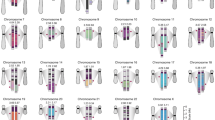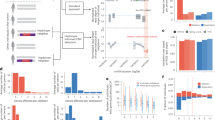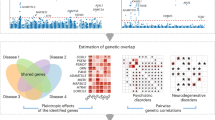Abstract
Glucose 6-phosphate dehydrogenase (G6PD) catalyses the first reaction of the so-called oxidative pathway of glucose metabolism1. In many cells, in addition to providing pentose sugars required for nucleic acid synthesis, G6PD has a major role in providing an adequate supply of reducing power in the form of NADPH (ref. 2). The enzyme has been purified and characterized from many sources3. G6PD from mammalian cells consists of a homodimer or a homotetramer, with a subunit molecular weight of ∼58,000 (ref. 4), and its structural gene is located on the X chromosome5. Genetic variation of G6PD is extensive in humans. Many variants associated with relative deficiency of enzyme activity ('CG6PD(–)') are polymorphic in various populations and have probably been selected for by Plasmodium falciparum malaria6. A number of G6PD(–) variants can cause either acute or chronic haemolytic anaemia and therefore have considerable clinical importance7. We considered that a knowledge of the G6PD gene would be of interest because it may be representative of a large number of genes and could help to elucidate in detail the basis for various forms of G6PD deficiency. Here we report how G6PD cDNA sequences have been cloned starting from human mRNA in which G6PD mRNA is present at an abundance of less than 10−4
This is a preview of subscription content, access via your institution
Access options
Subscribe to this journal
Receive 51 print issues and online access
$199.00 per year
only $3.90 per issue
Buy this article
- Purchase on Springer Link
- Instant access to full article PDF
Prices may be subject to local taxes which are calculated during checkout
Similar content being viewed by others
References
Noltmann, E. A. & Kuby, S. A. in The Enzymes 2nd edn, Vol. 7 (eds Boyer, P. D., Landy, H. & Myrbäck, K.) 223–242 (Academic, New York, 1963).
Luzzatto, L. & Testa, U. Curr. Topics Hemat. 1, 1–70 (1978).
Levy, H. R. Adv. Enzym. 48, 97–184 (1979).
Shreve, D. S. & Levy, H. R. Biochem. biophys. Res. Commun. 78, 1369–1375 (1977).
Gartler, S. M. & Andina, R. J. Adv. hum. Genet. 7, 99–146 (1976).
Luzzatto, L. Blood 54, 961–976 (1979).
Beutler, E. in The Metabolic Basis of Inherited Disease 4th edn (eds Stanbury, J. B., Wyngaarden, J. B. & Fredrickson, D. S.) 1430–1451 (McGraw-Hill, New York, 1978).
Sly, W. S. & Grubb, J. Meth. Enzym. 58, 444–450 (1979).
Stroham, R. C. et al. Cell 10, 265–273 (1978).
Sobel, M. E. et al. Proc. natn. Acad. Sci. U.S.A. 75, 5846–5850 (1978).
Efstratiadis, A., Kafatos, F. C., Maxam, A. M. & Maniatis, T. Cell 7, 279–288 (1976).
Gordon, J. I. et al. J. biol. Chem. 253, 8629–8639 (1978).
Clarke, L. & Carbon, J. Proc. natn. Acad. Sci. U.S.A. 72, 4361–4365 (1975).
Dagert, M. & Ehrlich, S. D. Gene 6, 23–28 (1979).
Grunstein, M. & Hogness, D. S. Proc. natn. Acad. Sci. U.S.A. 72, 3961–3965 (1975).
Southern, E. M. J. molec. Biol. 98, 503–517 (1975).
Michelson, A. M. & Orkin, S. H. Cell 22, 371–377 (1980).
Efstratiadis, A. et al. Cell 21, 653–668 (1980).
Wolf, S., Mareni, C. & Migeon, B. Cell 21, 95–102 (1980).
Pelham, H. R. B. & Jackson, R. J. Eur. J. Biochem. 67, 247–256 (1976).
Laemmli, U. K. Nature 227, 680–685 (1970).
De Flora, A., Morelli, F., Benatti, U. & Giuliano, F. Archs Biochem. Biophys. 169, 362–363 (1975).
Kessler, S. W. J. Immun. 117, 1482–1490 (1976).
Bonner, W. M. & Laskey, R. A. Eur. J. Biochem. 46, 83–88 (1974).
Locker, J. Analyt. Biochem. 98, 358–367 (1979).
Bolivar, F. et al. Gene 2, 95–113 (1977).
Radloff, R., Bauer, W. & Vinograd, J. Proc. natn. Acad. Sci. U.S.A. 57, 1514–1521 (1967).
Woolford, J. L. Jr & Rosbash, M. Nucleic Acids Res. 6, 2483–2497 (1979).
Petit Setlow, V., Persico Di Lauro, M., Edwards, C. A. F. & Martin, R. G. Virology 101, 250–260 (1980).
Fritsch, E. F., Lawn, R. M. & Maniatis, T. Nature 279, 598–603 (1979).
Blin, N. & Stafford, D. W. Nucleic Acids Res. 3, 2303–2308 (1976).
Jeffreys, A. J. et al. Cell 21, 555–563 (1980).
Rigby, P. W. J. et al. J. molec. Biol. 113, 237–246 (1977).
Author information
Authors and Affiliations
Rights and permissions
About this article
Cite this article
Persico, M., Toniolo, D., Nobile, C. et al. cDNA sequences of human glucose 6-phosphate dehydrogenase cloned in pBR322. Nature 294, 778–780 (1981). https://doi.org/10.1038/294778a0
Received:
Accepted:
Issue Date:
DOI: https://doi.org/10.1038/294778a0
This article is cited by
-
Recent aspects on glucose-6-phosphate dehydrogenase
Carlsberg Research Communications (1984)
-
Close linkage of fragile X-mental retardation syndrome to haemophilia B and transmission through a normal male
Nature (1983)
-
Regulation of glucose 6-phosphate dehydrogenase expression in CHO-human fibroblast somatic cell hybrids
Somatic Cell Genetics (1983)
Comments
By submitting a comment you agree to abide by our Terms and Community Guidelines. If you find something abusive or that does not comply with our terms or guidelines please flag it as inappropriate.



